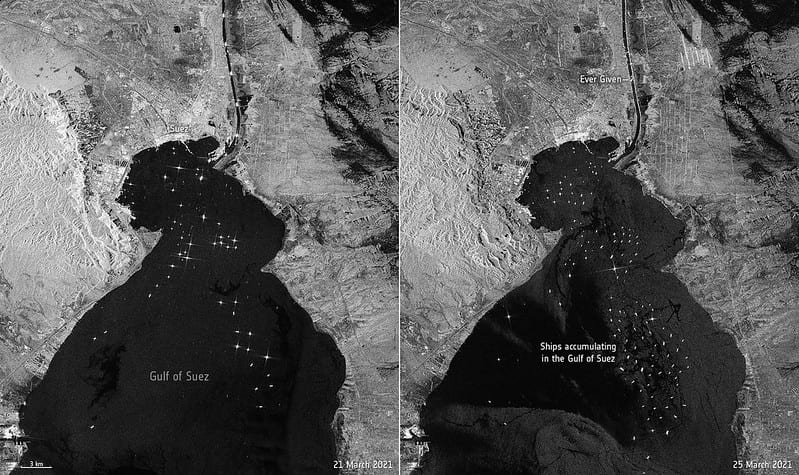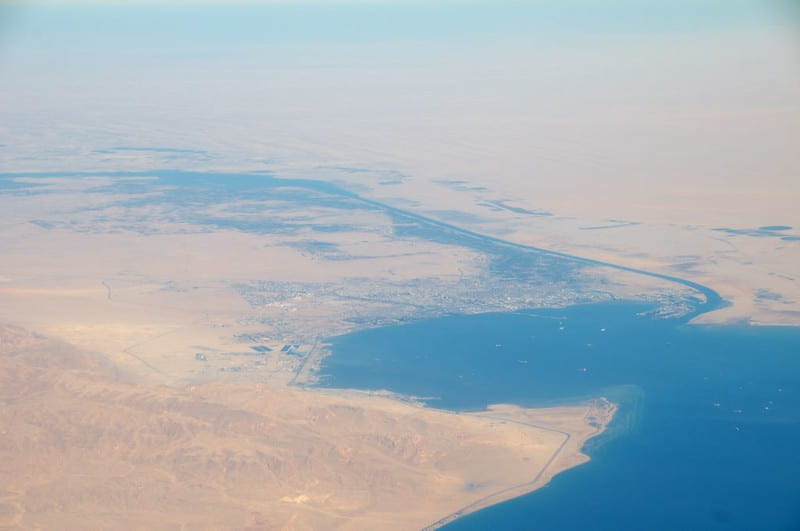Every significant economic market in the world has a large reliance on the global supply chain, or globalization. These supply chains rely on canals to connect one side of the world to the other, including the Panama Canal and the Suez Canal. On Tuesday March 22nd, one ship single handedly disrupted the entire global supply chain. The Ever Given, one of the largest container ships in the world, ran aground in the middle of the Suez Canal. This event blocked any other container ships from crossing the Suez Canal in either direction, effectively cutting off a major link between Asian markets and European markets.

According to an analysis by Bloomberg, the Suez Canal blockage created by the Ever Given is holding up $9.6 billion of goods. Some blocked ships are carrying oil, others are carrying items from electronics to clothes. Should the blockade in the Canal last for two weeks, nearly one-fourth of the container ships that would normally be in European ports will be blocked. Normally, approximately 12% of global trade passes through the Suez Canal. Every day, the canal is able to move about 106 large shipping containers between Asia and Europe. To put this in perspective, before it was released, it is estimated that the Ever Given was holding up about $400 million an hour.
The world has recently been relying on markets that reduce the need for stockpiling items and instead provide products “just in time.” The internet and the current system of global shipping allow companies and consumers to buy and receive products right when they need them, instead of stockpiling. The COVID-19 pandemic provided a fantastic example of how “just in time” manufacturing has major flaws. From toilet paper to essential medical protective gear, certain products were in very high demand around the world. There was the assumption that these products could be delivered quickly and dependently to those who needed them at the start of the pandemic. However, this calculation was severely flawed and the high demand from all corners of the world for the same products caused months of delays in manufacturing leading to deadly consequences.

The Suez Canal runs through Egypt, connecting the Mediterranean Sea to the Indian Ocean. The canal was initially owned by French investors when it was conceived in the mid-1800s. The construction of the canal began in 1859 and took 10 years and 1.5 million workers. These workers were drafted from Egyptian peasants, approximately 20,000 peasants every 10 months, for extremely difficult work that was very poorly compensated. Many of these workers died of various diseases, including cholera, during their time working on the canal. Throughout the World Wars, Britain controlled the canal. However in 1956, British powers withdrew after many years of negotiating with Egypt. At that point, the Egyptian government led by President Gamal Abdel Nasser had control of the canal. The Suez Crisis began in 1956. Nasser had decided to nationalize the canal once the British forces departed. Israeli, British, and French forces decided to stage a military intervention after deciding the Egyptian response to the canal could be seen as a security threat. The crisis ended in 1957 due to the first-ever United Nations’ peacekeeping force.
The Suez Canal blockage created by the Ever Given has brought to light how much the world relies on cargo ships. 90% of the global trade is carried out within maritime supply chains. As the COVID-19 pandemic has continued, thousands of workers on ships have been stranded due to COVID-19 restrictions, unable to return to home countries and unable to be relieved. This has become a humanitarian crisis. Seafarers are the ones providing the world with food, essential supplies, and any other items purchased by consumers. However, they have been unable to leave their ships and go home to their families.

Crews on the ships are supposed to rotate on and off the vessels every 11 months. However due to the pandemic, many seafarers have long surpassed this 11 month marker and still have no notice as to when they can return home. Even before the pandemic, seafaring is a difficult job. The shifts are long, sleeping quarters are tight, and there is very little contact with those off of the ship. At the beginning of the pandemic, the situation was even described as bordering on forced labor. A major problem is the growing levels of fatigue experienced by the crew on ships. The number of reported suicides within this population has doubled, with this statistic not including the cases that were deemed accidents or missing at sea.
While the blockage of the Suez Canal by the massive ship, the Ever Given, has prompted memes and jokes around the world, it has brought more attention to the world’s reliance on shipping industries and to the lack of welfare experienced by seafarers. The Ever Given rendered the Suez Canal virtually useless for many days and the ramifications of this will fall primarily on the backs of shipping industry workers. It is important to recognize how COVID-19 has impacted the global economy as well as seafarers and to work towards achieving fair rights for these workers.
